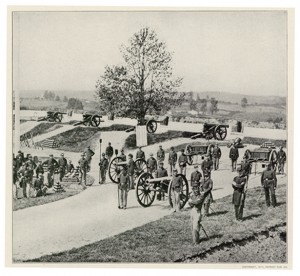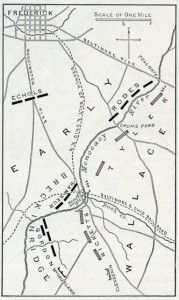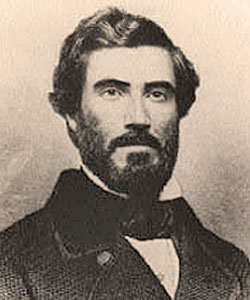 Even though Hinton Rowan Helper published The Impending Crisis of the South: How to Meet It in 1857, the book was still a factor in the election of 1860. While Helper was born in North Carolina to a family that owned more than 200 slaves, he used the Impending Crisis to call for the South to end slavery. That institution, as Helper argued, limited the economic potential of white labor and prevented the South’s economy from developing. In 1859 Helper published the Compendium of the Impending Crisis of the South – a cheaper edition of that reached thousands of readers. By the election of 1860 northern Democratic editors like James Gordon Bennett, who owned the New York Herald, used Helper’s book as evidence that the Republican party was dangerous to the United States. On election day in November 1860 the Herald warned voters that Republicans had “circulated hundreds of thousands of Helper’s handbook of treason.” Prominent Republicans had endorsed the book, which as the Herald explained, were “[distributed] to abolitionize the Northern mind.” If Abraham Lincoln became President, the Herald argued that “one phase of [his] administration [would be] to engender or to inaugurate, if possible, a civil war at the South between the non-slaveholding whites of that section (excited by abolition emissaries) and those who own slaves.” One of the best secondary sources on Helper is David Brown’s Southern Outcast: Hinton Rowan Helper and The Impending Crisis of the South (2006).
Even though Hinton Rowan Helper published The Impending Crisis of the South: How to Meet It in 1857, the book was still a factor in the election of 1860. While Helper was born in North Carolina to a family that owned more than 200 slaves, he used the Impending Crisis to call for the South to end slavery. That institution, as Helper argued, limited the economic potential of white labor and prevented the South’s economy from developing. In 1859 Helper published the Compendium of the Impending Crisis of the South – a cheaper edition of that reached thousands of readers. By the election of 1860 northern Democratic editors like James Gordon Bennett, who owned the New York Herald, used Helper’s book as evidence that the Republican party was dangerous to the United States. On election day in November 1860 the Herald warned voters that Republicans had “circulated hundreds of thousands of Helper’s handbook of treason.” Prominent Republicans had endorsed the book, which as the Herald explained, were “[distributed] to abolitionize the Northern mind.” If Abraham Lincoln became President, the Herald argued that “one phase of [his] administration [would be] to engender or to inaugurate, if possible, a civil war at the South between the non-slaveholding whites of that section (excited by abolition emissaries) and those who own slaves.” One of the best secondary sources on Helper is David Brown’s Southern Outcast: Hinton Rowan Helper and The Impending Crisis of the South (2006).
16
Aug
10
Election of 1860 – Hinton Rowan Helper
Posted by sailerd Published in Antebellum (1840-1861), Historic Periodicals, Rare Books Themes: Contests & Elections14
Jul
10
“The Impending Crisis,” 1860 political cartoon
Posted by solnitr Published in Antebellum (1840-1861), Images, Rare Books, Recent Scholarship Themes: Contests & Elections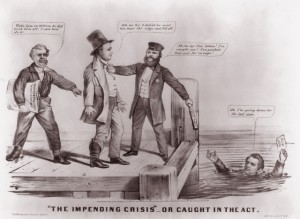 The Republican Party held its second national convention beginning at noon on May 16, 1860 in Chicago. The presidential nominees included the veteran statesmen Edward Bates, Salmon P. Chase, Simon Cameron, and William H. Seward, as well as a new senator from Illinois, Abraham Lincoln. Although Seward was the favorite going into the convention and led the nominees on the first two ballots, Lincoln won the Republican presidential candidacy. Republican delegates had looked to back the candidate they felt could generate the most electoral support. Horace Greeley, the editor of the New York Tribune, had the ears of 48 delegates. Greeley’s battle cry was “anyone but Seward!” and initially gave his support to Bates. According to Greeley’s recent biographer Robert Chadwell Williams, as Lincoln began closing in on Seward in the third ballot, Greeley shifted his 48 votes over to Lincoln, giving him the candidacy.
The Republican Party held its second national convention beginning at noon on May 16, 1860 in Chicago. The presidential nominees included the veteran statesmen Edward Bates, Salmon P. Chase, Simon Cameron, and William H. Seward, as well as a new senator from Illinois, Abraham Lincoln. Although Seward was the favorite going into the convention and led the nominees on the first two ballots, Lincoln won the Republican presidential candidacy. Republican delegates had looked to back the candidate they felt could generate the most electoral support. Horace Greeley, the editor of the New York Tribune, had the ears of 48 delegates. Greeley’s battle cry was “anyone but Seward!” and initially gave his support to Bates. According to Greeley’s recent biographer Robert Chadwell Williams, as Lincoln began closing in on Seward in the third ballot, Greeley shifted his 48 votes over to Lincoln, giving him the candidacy.
This Currier & Ives political cartoon shows Seward drowning of the pier after being pushed in by Greeley (the figure in the top hat). Drawn by Louis Maurer and published in 1860, “Impending Crisis” satirizes the influential role of newspapermen in Civil War-era politics. Henry J. Raymond (in the police uniform), founder of the New York Times, also helped write the charter of the Republican Party in 1856 and later was a New York Representative. James Watson Webb (on the left dressed as a newspaper boy), editor of Courier & Esquirer, recently threw his support behind the Republican Party. The title of the cartoon refers the book written by Hinton Rowan Helper in 1857, The Impending Crisis of the South: How to Meet It, which denounced slavery from an economic viewpoint—slavery prevented a diverse economy, disadvantaging poor Southerners. Although Seward is undergoing the crisis of losing the Republican presidential candidacy in this cartoon, he would become Lincoln’s Secretary of State, a member of a cabinet filled with Lincoln’s previous political rivals.
12
Jul
10
The Battle of Five Forks, April 1, 1865
Posted by solnitr Published in Civil War (1861-1865), Maps, Rare Books, Recent Scholarship Themes: Battles & Soldiers, Carlisle & Dickinson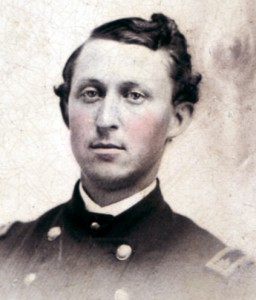 On September 23, 1897 Horatio Collins King, a member of Dickinson College Class of 1858, received a Medal of Honor for his acts of bravery during the battle of Five Forks. As quartermaster of the first cavalry division of the Army of the Shenandoah, King fought in one of the final Eastern battles of the Civil War in Five Forks, Virginia on April 1, 1865. Maj. General Philip Sheridan led 50,000 Union troops in a victory over a Confederate force only one-fifth the size. In his military history, Campaigns of the Army of the Potomac (2008), William Swinton explains the Union victory and capture of the Southside Railroad at Five Forks in terms the battle’s greater significance in the war. Within the eight days following the battle of Five Forks the Confederate Army had retreated from Petersburg and Richmond and General Robert E. Lee had surrendered his army to General Ulysses S. Grant at Appomattox Courthouse.
On September 23, 1897 Horatio Collins King, a member of Dickinson College Class of 1858, received a Medal of Honor for his acts of bravery during the battle of Five Forks. As quartermaster of the first cavalry division of the Army of the Shenandoah, King fought in one of the final Eastern battles of the Civil War in Five Forks, Virginia on April 1, 1865. Maj. General Philip Sheridan led 50,000 Union troops in a victory over a Confederate force only one-fifth the size. In his military history, Campaigns of the Army of the Potomac (2008), William Swinton explains the Union victory and capture of the Southside Railroad at Five Forks in terms the battle’s greater significance in the war. Within the eight days following the battle of Five Forks the Confederate Army had retreated from Petersburg and Richmond and General Robert E. Lee had surrendered his army to General Ulysses S. Grant at Appomattox Courthouse.
Nonetheless, for the soldiers who fought at Five Forks, the battle remained a personal experience. In his Civil War Journal (digitized in the Dickinson College database “Their Own Words”), Horatio King did not go to lengths to discuss the meaning of the battle and the Confederate retreat. Instead, King wrote a poignant passage describing a dead Southern soldier he encountered while collecting the wounded: “his face was raised toward heaven and the open eyes & sweet expression of countenance together with the hands uplifted as in prayer gave me the impression that he still lived.” Battles were personal affairs for generals as well, as exemplified by Gouverneur Kemble Warren’s obsession with Five Forks. After the battle, Sheridan relieved Warren of his command of the V Corps, and when Warren “personally sought of General Sheridan a reason for his order,” “he would not or could not give one.” After more than a decade of seeking an explanation, Warren finally received official recognition of his unjust treatment when President Rutherford B. Hayes authorized a court of inquiry on December 9, 1879.
The National Park Service has preserved Five Forks as part of the larger Petersburg National Battlefield. Their website contains Five Forks resources including multiple battle maps. J. Tracy Power’s Lee’s Miserables : Life in the Army of Northern Virginia from the Wilderness to Appomattox (1998) is a unique military history of the last year of the war that uses Confederate soldier’s letters and diaries as a primary source of evidence, giving readers a different angle on the battle of Five Forks.
To view a Flickr slideshow on this battle, click on any of the images below:
28
Jun
10
The Underground Railroad in Columbia, Pennsylvania
Posted by solnitr Published in 19th Century (1840-1880), Images, Places to Visit, Rare Books Themes: Battles & Soldiers, Slavery & Abolition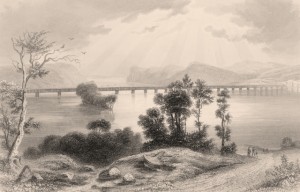 Nineteenth-century historian Robert Clemens Smedley labeled the town of Columbia, Pennsylvania as the birthplace of the organized structure that we now know as the Underground Railroad. Smedley’s posthumously published account of the Underground Railroad’s presence in Pennsylvania, History of the Underground Railroad in Chester and the Neighboring Counties of Pennsylvania (1883), is available on Dickinson College and Mercersville University’s digital collection: “Slavery & Abolition in the US: Select Publications of the 1800s .” Smedley narrates the story of the Underground Railroad with Columbia as a key station on the Underground Railroad because of its proximity to the Pennsylvania-Maryland border, just across the Susquehanna River. The Wright family, which founded Columbia in 1726, maintained a sympathetic ear towards the abolitionist cause reflecting their Quaker background. Today the Wright family home, Wright’s Ferry Mansion , is open to the public for tours. The founder’s grandson, William Wright, “an uncompromising hater of slavery,” became one of the first established agents of the Underground Railroad, setting up a network for escaping slaves in Columbia. Fergus M. Bordewich, author of the comprehensive Underground Railroad book Bound for Canaan (2005) mentions Wright briefly as “hitting on the idea of passing fugitives along from one home to another at intervals of ten or twenty miles, with other friends designated to pilot them in between.” Wright’s network included Robert Loney (or Loonee), a free black man who “ferried fugitives across the [Susquehanna] river in the night at various places below Columbia, and gave them into the care of William Wright.” Loney went on to join Company I of the 32nd Regiment of the USCT in 1864 and is buried in Columbia’s recently restored Zion Hill Cemetery (5th & Linden Streets, Columbia, PA), the burial place of many local black Civil War veterans. The Pennsylvania “Quest for Freedom ” tour, which maps the historic locations of abolition-related sites from Philadelphia to Chambersburg, includes a stop in Columbia that highlights the Zion Hill Cemetery. The USGenWeb Tombstone Transcription Project also includes a Zion Hill webpage with recent photos of fourteen USCT headstones.
Nineteenth-century historian Robert Clemens Smedley labeled the town of Columbia, Pennsylvania as the birthplace of the organized structure that we now know as the Underground Railroad. Smedley’s posthumously published account of the Underground Railroad’s presence in Pennsylvania, History of the Underground Railroad in Chester and the Neighboring Counties of Pennsylvania (1883), is available on Dickinson College and Mercersville University’s digital collection: “Slavery & Abolition in the US: Select Publications of the 1800s .” Smedley narrates the story of the Underground Railroad with Columbia as a key station on the Underground Railroad because of its proximity to the Pennsylvania-Maryland border, just across the Susquehanna River. The Wright family, which founded Columbia in 1726, maintained a sympathetic ear towards the abolitionist cause reflecting their Quaker background. Today the Wright family home, Wright’s Ferry Mansion , is open to the public for tours. The founder’s grandson, William Wright, “an uncompromising hater of slavery,” became one of the first established agents of the Underground Railroad, setting up a network for escaping slaves in Columbia. Fergus M. Bordewich, author of the comprehensive Underground Railroad book Bound for Canaan (2005) mentions Wright briefly as “hitting on the idea of passing fugitives along from one home to another at intervals of ten or twenty miles, with other friends designated to pilot them in between.” Wright’s network included Robert Loney (or Loonee), a free black man who “ferried fugitives across the [Susquehanna] river in the night at various places below Columbia, and gave them into the care of William Wright.” Loney went on to join Company I of the 32nd Regiment of the USCT in 1864 and is buried in Columbia’s recently restored Zion Hill Cemetery (5th & Linden Streets, Columbia, PA), the burial place of many local black Civil War veterans. The Pennsylvania “Quest for Freedom ” tour, which maps the historic locations of abolition-related sites from Philadelphia to Chambersburg, includes a stop in Columbia that highlights the Zion Hill Cemetery. The USGenWeb Tombstone Transcription Project also includes a Zion Hill webpage with recent photos of fourteen USCT headstones.
23
Jun
10
Carlisle Fencibles
Posted by mckelveb Published in Civil War (1861-1865), Letters & Diaries, Rare Books Themes: Battles & Soldiers, Carlisle & Dickinson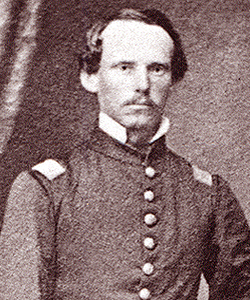 After the outbreak of the Civil War, four volunteer companies originally consisting of fifty to one hundred men were recruited in Carlisle, Pennsylvania on April 19, 1861. On April 21, the officers were chosen with Captain Robert M. Henderson, in charge of Company A of the 36th Regiment, 7th Pennsylvania Reserve Corps. Henderson was assisted in command by First Lieutenant James S. Colwell, Second Lieutenant Erkuries Beatty, and First Sergeant John D. Adair. These men received the nickname “Carlisle Fencibles” in part because most of its members belonged to a gymnastic club and because a “fencible” is a defender of a country. The company spent a two month period of relative inactivity marching and drilling until the soldiers left for Camp Wayne in West Chester, Pennsylvania on June 6. Before the men departed they received a satin flag from Mrs. Samuel Alexander, a granddaughter of Ephraim Blaine, that, according to David G. Colwell, had the inscription “May God defend the right!” The 7th Pennsylvania Reserves went on to fight in the Battles of Gaines’ Mill, Bull Run, and Antietam while suffering great losses. A more thorough description of the experiences of the company is available on Google Books in Samuel B. Bates’ History of Pennsylvania Volunteers, 1861-65 . The wartime experience of one member of the Carlisle Fencibles, John Taylor Cuddy, is chronicled through letters he sent home to his family in Carlisle. His correspondence is available as a part of Dickinson College’s “Their Own Words” digital archive which provides a picture of the experience of a young Carlisle Fencible during the Civil War.
After the outbreak of the Civil War, four volunteer companies originally consisting of fifty to one hundred men were recruited in Carlisle, Pennsylvania on April 19, 1861. On April 21, the officers were chosen with Captain Robert M. Henderson, in charge of Company A of the 36th Regiment, 7th Pennsylvania Reserve Corps. Henderson was assisted in command by First Lieutenant James S. Colwell, Second Lieutenant Erkuries Beatty, and First Sergeant John D. Adair. These men received the nickname “Carlisle Fencibles” in part because most of its members belonged to a gymnastic club and because a “fencible” is a defender of a country. The company spent a two month period of relative inactivity marching and drilling until the soldiers left for Camp Wayne in West Chester, Pennsylvania on June 6. Before the men departed they received a satin flag from Mrs. Samuel Alexander, a granddaughter of Ephraim Blaine, that, according to David G. Colwell, had the inscription “May God defend the right!” The 7th Pennsylvania Reserves went on to fight in the Battles of Gaines’ Mill, Bull Run, and Antietam while suffering great losses. A more thorough description of the experiences of the company is available on Google Books in Samuel B. Bates’ History of Pennsylvania Volunteers, 1861-65 . The wartime experience of one member of the Carlisle Fencibles, John Taylor Cuddy, is chronicled through letters he sent home to his family in Carlisle. His correspondence is available as a part of Dickinson College’s “Their Own Words” digital archive which provides a picture of the experience of a young Carlisle Fencible during the Civil War.
15
Jun
10
The Sinking of the CSS Alabama, June 19, 1864
Posted by solnitr Published in Civil War (1861-1865), Images, Letters & Diaries, Rare Books, Recent News Themes: Battles & Soldiers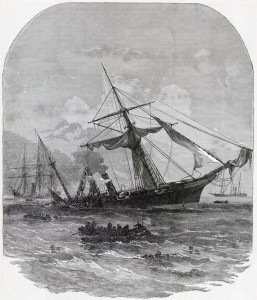 On the morning of June 19, 1864, before the naval battle with the USS Kearsarge Captain Raphael Semmes of the CSS Alabama, in an impassioned address, spoke to his crew:
On the morning of June 19, 1864, before the naval battle with the USS Kearsarge Captain Raphael Semmes of the CSS Alabama, in an impassioned address, spoke to his crew:
- “you have been all over the world and it is not too much to say that you have destroyed and driven for protection under neutral flags one half of the enemy’s commerce which at the beginning of the war covered every sea This is an achievement of which you may well be proud and a grateful country will not be unmindful of it The name of your ship has become a household word wherever civilization extends Shall that name be tarnished by defeat The thing is impossible Remember that you are in the English Channel the theatre of so much of the naval glory of our race and that the eyes of all Europe are at this moment upon you The flag that floats over you is that of a young Republic who bids defiance to her enemies whenever and wherever found Show the world that you know how to uphold it.”
Semmes recorded his personal experiences as the captain of CSS Alabama and Sumter in his personal memoir My Adventures Afloat … (1869), available on Google Books. Captain Semmes’ stirring speech did not stop the USS Kearsarge on June 19, 1684 from sinking the Alabama and putting an end to her formidable record. In less than two years the CSS Alabama, a Confederate ship that engaged in commerce raiding by destroying Union merchant ships, sunk 62 ships including the USS Hatteras. The Naval History & Heritage Command, an agency of the Department of the Navy, outlines the history of the ship in an educational website that includes a wide range of resources for classroom use. Students can view images of the battle as published in contemporary newspapers, read excerpts from the official reports of both the Union Captain John Winslow and the Confederate Captain Semmes, or explore recent press releases about the underwater archaeological work being conducted on the wreck since its discovery in 1988 off the coast of France. For other resources, see Historyofwar.org , where they provide maps of the CSS Alabama’s routes and of the battle with the USS Kearsarge.
[flickrslideshow acct_name=”housedivided” id=”72157624282521058″]
7
Jun
10
Battle of Cynthiana: June 11-12, 1864
Posted by mckelveb Published in Civil War (1861-1865), Maps, Places to Visit, Rare Books Themes: Battles & Soldiers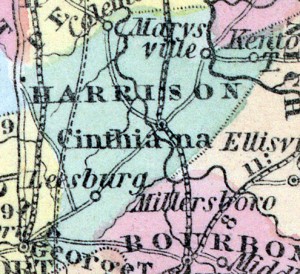 The Battle of Cynthiana (also known as Kellar’s Bridge) took place on June 11-12, 1864 in Harrison County, Kentucky. The National Park Service ’s website includes a brief summary regarding the battle and the Civil War Sites Advisory Commission provides a map detailing the location of each battleground within the state as well as an overview on the condition of each individual site. The Cynthiana battleground has over eight hundred acres of land intact that would make field trips and walking tours of the area possible. On June 11, Confederate General John Hunt Morgan and his forces attacked General Edward Hobson and the 171st Ohio National Guard, taking over one thousand prisoners of war captive. The following day, Union General Stephen Gano Burbridge along with the 168th Regiment Ohio Volunteer Infantry and the Kentucky Harrison County Home Guards attacked the Confederate forces at dawn and drove them back. Collins’ Historical Sketches of Kentucky: History of Kentucky, Volume 2 described the scene of the battle:
The Battle of Cynthiana (also known as Kellar’s Bridge) took place on June 11-12, 1864 in Harrison County, Kentucky. The National Park Service ’s website includes a brief summary regarding the battle and the Civil War Sites Advisory Commission provides a map detailing the location of each battleground within the state as well as an overview on the condition of each individual site. The Cynthiana battleground has over eight hundred acres of land intact that would make field trips and walking tours of the area possible. On June 11, Confederate General John Hunt Morgan and his forces attacked General Edward Hobson and the 171st Ohio National Guard, taking over one thousand prisoners of war captive. The following day, Union General Stephen Gano Burbridge along with the 168th Regiment Ohio Volunteer Infantry and the Kentucky Harrison County Home Guards attacked the Confederate forces at dawn and drove them back. Collins’ Historical Sketches of Kentucky: History of Kentucky, Volume 2 described the scene of the battle:
“Fatigued as they were by the previous day’s operations- which resulted in the defeat and capture of two distinct Federal forces- the Confederates were not in condition to withstand the shock of a fresh body of troops. Burbridge, with his cavalry, was enabled to flank them, and thus turn their lines; while his infantry, in the center, advanced steadily, forcing them back on the town. The fighting commenced on Millersburg pike, about one mile east of Cynthiana. But the Confederates- unable to hold out against the rapid and determined advance of superior numbers of fresh troops supported by artillery- soon gave way, and, by the time they reached Cynthiana, were in full retreat, and the retreat a rout. One by one, they fell back through the town, crossed the river, and followed the Raven Creek pike. Thus ended the battle that was fought at Cynthiana in the war for southern independence.”
Some suggestions for further reading on the Battle of Cynthiana include Chronicles of Cynthiana which gives a fairly concise overview of the second battle at the site. Other interesting resources are the Official Records and the History of Morgan’s Cavalry which provides background information on General Morgan’s early life and his participation in the Confederate army.
4
Jun
10
Alexander Kelly and the Battle of Chaffin’s Farm
Posted by mckelveb Published in Civil War (1861-1865), Historic Periodicals, Rare Books, Recent Scholarship Themes: Battles & Soldiers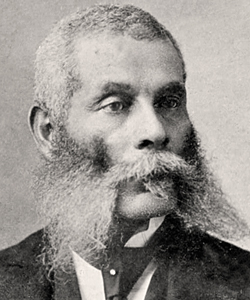 Alexander Kelly was an African- American Civil War soldier who was awarded the Congressional Medal of Honor. He was born on April 7, 1840 in Saltsburg, Pennsylvania and worked as a coal miner prior to his involvement in the war. On August 19, 1863 in Allegheny City, Pennsylvania he enlisted in Company F of the 6th United States Colored Troops Regiment as a substitute for someone named Joseph Kelly. He was originally trained at Camp William Penn in Chelten Hills, Pennsylvania. Although Kelly was small in stature, standing at only about 5 feet 3 inches tall, he was commended for his actions at Chaffin’s Farm in Henrico County, Virginia on September 29-30, 1864. The National Park Service’s website includes a brief summary on the battle at Chaffin’s Farm (also known as New Market Heights) that includes how Union Major General Benjamin Butler attacked General Robert E. Lee and the Confederate forces at Richmond. A more detailed description of the battle at Chaffin’s Farm is provided in “Pennsylvania Negro Regiments in the Civil War .” Kelly was awarded a Congressional Medal of Honor on April 6, 1865 for his bravery and leadership at Chaffin’s Farm. General Benjamin Butler noted in an order issued on October 11, 1864:
Alexander Kelly was an African- American Civil War soldier who was awarded the Congressional Medal of Honor. He was born on April 7, 1840 in Saltsburg, Pennsylvania and worked as a coal miner prior to his involvement in the war. On August 19, 1863 in Allegheny City, Pennsylvania he enlisted in Company F of the 6th United States Colored Troops Regiment as a substitute for someone named Joseph Kelly. He was originally trained at Camp William Penn in Chelten Hills, Pennsylvania. Although Kelly was small in stature, standing at only about 5 feet 3 inches tall, he was commended for his actions at Chaffin’s Farm in Henrico County, Virginia on September 29-30, 1864. The National Park Service’s website includes a brief summary on the battle at Chaffin’s Farm (also known as New Market Heights) that includes how Union Major General Benjamin Butler attacked General Robert E. Lee and the Confederate forces at Richmond. A more detailed description of the battle at Chaffin’s Farm is provided in “Pennsylvania Negro Regiments in the Civil War .” Kelly was awarded a Congressional Medal of Honor on April 6, 1865 for his bravery and leadership at Chaffin’s Farm. General Benjamin Butler noted in an order issued on October 11, 1864:
“Alexander Kelly, first sergeant Company F, Sixth U.S. Colored Troops, gallantly seized the colors, which had fallen near the enemy’s lines of abatis, raised them, and rallied the men at a time of confusion and in a place of great danger.”
Another resource that may be interesting to browse is Black Union Soldier’s in the Civil War which has a valuable list detailing all the Black Union Recipients of the Congressional Medal of Honor. Kelly was “mustered out” of service in Wilmington, North Carolina in 1865. After the war, Kelly married his wife Victoria on July 30, 1866, and the two had a son named William in January 1867. He served as a night watchman for the Pittsburgh Police before his death on June 19, 1907. Kelly is buried in St. Peters Cemetery in Pittsburgh, Pennsylvania.
3
Jun
10
Fort Stevens: July 11-12, 1864
Posted by mckelveb Published in Civil War (1861-1865), Lesson Plans, Places to Visit, Rare Books Themes: Battles & SoldiersOn July 11, 1864, two days after the Battle of Monocacy, Confederate forces under the command of General Jubal A. Early reached the edge of Washington D.C. The following day, the Confederate forces faced the Union VI Corps under the direction of Major General Horatio G. Wright and Major General Alexander M. McCook and were eventually forced to withdraw from the city which ended General Early’s invasion of Maryland. President Abraham Lincoln watched the battle from Fort Stevens and was in close proximity to the fighting. The National Park Service’s website provides a concise summary of the battle as well as the number of casualties that occurred in the midst of the fighting. It also includes a report on the preservation of the battlefield from the Civil War Sites Advisory Committee which shows that although most of the site has been destroyed or altered through urban development there is still an area that remains preserved in Rock Creek Park and can be visited today. The National Park Service offers lesson plans for teachers under the Historical Context for Fort Circle Parks that has key resources for classroom learning as well as suggestions for additional sources. The Grand Army of the Republic’s Washington During Wartime described the scene with President Lincoln at Fort Stevens during a conversation with General Wright:
“I entreated the President not to expose his life to the bullets of the enemy; but he seemed oblivious to his surroundings; finally, when I found that my entreaties had failed to make any impression on him, I said, ‘Mr. President, I know you are commander of the armies of the United States, but I am in command here, and as you are not safe when you are standing, I order you to come sit down here.’ Mr. Lincoln looked at me and smiled, and then, in more consideration of my earnestness than inclination, stepped down and took position behind the parapet. Even then he would persist in standing up and exposing his tall form.”
Some other sources on Fort Stevens that may be interesting to browse are Robert Sampson Lanier’s The Photographic History of the Civil War: Forts and Artillery as it provides some valuable images of soldiers stationed at Fort Stevens during the Civil War along with summaries of the major battles fought around the Washington D.C. area. Two other interesting sources that can be found on Google Books are Recollections of the Civil War: With Many Original Diary Entries and Letters Written from the Seat of War, and With Annotated References and the Official Records since both give many firsthand accounts written by soldiers and officers who took part in the fighting at Fort Stevens.
2
Jun
10
The Battle of Monocacy- July 9, 1864
Posted by mckelveb Published in Civil War (1861-1865), Images, Maps, Places to Visit, Rare Books Themes: Battles & SoldiersThe Battle of Monocacy on July 9, 1864 in Frederick County, Maryland became known as “The battle that saved Washington” as it gave supporting Union troops more time to fill the area and defend the Capital. The National Park Service ’s website provides resources including a short summary of the battle and a map that shows the location of the battle as well as a detailed overview regarding the preservation of the site. The Confederate forces were led by Lieutenant General Jubal A. Early whose memoir provides an interesting account of the battle from the Confederate perspective. Major General Lew Wallace (who later on became better known as the author of the novel Ben Hur) and the Union forces attempted to arrest Early and the Confederate forces, but were defeated. General Ulysses S. Grant highlighted the importance of the battle through an excerpt from his memoir:
“If Early had been but one day earlier, he might have entered the Capital before the arrival of the reinforcements I had sent. Whether the delay caused by the battle [Monocacy] amounted to a day or not, General Wallace, on this occasion, by the defeat of the troops under him, contributed to a greater benefit to the cause than often falls to the lot of a commander of an equal force to render by means of a victory.”
There are several other interesting books which could be valuable to learning about the Battle of Monocacy from both the Union and Confederate perspectives. Along with Early’s memoir, John H. Worsham’s One of Jackson’s Foot Cavalry: His Experience and What He Saw During the War 1861-1865 provides a valuable first hand narrative of the author’s experience as a Confederate soldier who fought in the Battle of Monocacy. Also, The Land We Love, Volume II is available in full view on Google Books and contains Confederate General Gordon’s report on the battle which may be worthwhile to look at as it also contains reports and correspondence between other Confederate officials. Since the Civil War Sites Advisory Commission has made the preservation of the Monocacy National Battlefield one of its top priorities the park holds over one thousand acres and five walking trails which could provide for an interesting field trip .



